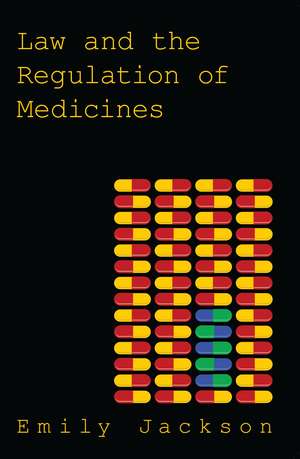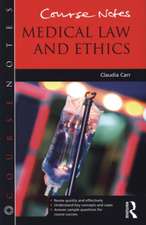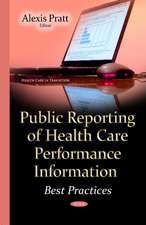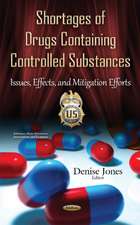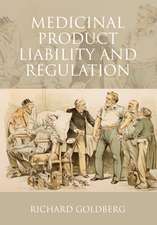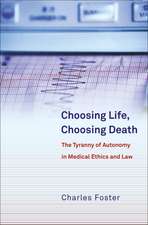Law and the Regulation of Medicines
Autor Emily Jacksonen Limba Engleză Paperback – 29 feb 2012
Preț: 311.84 lei
Preț vechi: 382.06 lei
-18% Nou
Puncte Express: 468
Preț estimativ în valută:
59.68€ • 64.80$ • 50.13£
59.68€ • 64.80$ • 50.13£
Carte tipărită la comandă
Livrare economică 23 aprilie-07 mai
Preluare comenzi: 021 569.72.76
Specificații
ISBN-13: 9781849461795
ISBN-10: 1849461791
Pagini: 308
Dimensiuni: 156 x 234 x 20 mm
Greutate: 0.36 kg
Ediția:New.
Editura: Bloomsbury Publishing
Colecția Hart Publishing
Locul publicării:London, United Kingdom
ISBN-10: 1849461791
Pagini: 308
Dimensiuni: 156 x 234 x 20 mm
Greutate: 0.36 kg
Ediția:New.
Editura: Bloomsbury Publishing
Colecția Hart Publishing
Locul publicării:London, United Kingdom
Caracteristici
This book tells the story of a medicine's journey through the regulatory system in the UK and emphasises the role of regulation in shaping and influencing the operation of the medicines industry.Written by an expert in the field the book focuses on the UK's regulatory regime but also looks at global access to medicines.The controversial issue surrounding pharmacogenetics and the possibility of using medicines to enhance wellbeing or performance, rather than treat disease are explored.The book will be of interest to medical lawyers and scholars interested in medial law as well as those who deal with the regulation of medicines on a professional basis.
Notă biografică
Emily Jackson is Professor of Law at the London School of Economics.
Cuprins
1 What are Medicines and why are they Special? I Why Medicines are Special II The Development of a Special Regulatory Regime for Medicines III What is a Medicine? IV Complementary and Alternative MedicinesV Conclusion2 Clinical Trials I What are Clinical Trials? II Regulating TrialsIII Ethical Review IV Trials and Industry V The Global Trials Industry VI Conclusion3 Licensing I The Significance of a Marketing Authorisation II Applying for a Marketing Authorisation III Grounds for Licensing Decisions IV Relationship between Regulators and Industry V Classification of Medicines VI Buying Prescription Drugs Online VII Conclusion4 Pharmacovigilance and Liability for Dangerous Drugs I Post-marketing Surveillance II The Consequences of Identifying Drug Safety Hazards III Liability for Drug Injuries IV Conclusion5 Marketing I Direct to Consumer Advertising II Selling Diseases III Patient Groups IV Public Relations V The Relationship between Doctors and the Pharmaceutical Industry VI Conclusion6 Funding and Access to Medicines in the UK I The Costs of Prescription Medicines II The Pharmaceutical Price Regulation Scheme III Value-Based Pricing IV The National Institute for health and Clinical Excellence (NICE) V Exceptional Case Review VI Judicial Review VII Top-Up Payments VIII Conclusion 7 Funding and Access to Medicines: A Global Problem I The Problem of Unaffordable Medicines II TRIPs, Doha and Generics III Incentives to Develop and Supply Treatments in Low-income Countries IV Humanitarian, Charitable and Philanthropic Initiatives VI Conclusion8 The Future of Medicines I: Pharmacogenetics I The Limitations of Genetic Testing II An Expansion in Genetic Testing: Consent and Confidentiality III Resource Implications IV Cost-effectiveness and Orphan Patients V Clinical Trials VI Licensing VII Withdrawn Medicines? VIII Improved Post-licensing Surveillance? IX Liability for Harm X Conclusion 9 The Future of Medicines II: Enhancement I The Line between Treatment and Enhancement II A Pharmacological Fix? III Enhancing Sporting Ability and Cheating IV A Parallel with Education? V Distributional Justice VI Coercion VII Prescription Drug Abuse VIII Transhumanism and Posthumanism: Utopia or the End of History? IX Conclusion Concluding Remarks
Recenzii
Although it is written by a legal scholar, this is not a book that focuses solely upon the narrowly 'legal', and it certainly does not concentrate almost exclusively on case law, as is the case with many books in the field of medical law. Rather, the case law, and the relevant legislation (both UK and EU), is placed firmly in its various contexts. This law-in-context approach contributes significantly to the success of the book, as does its interdisciplinarity. The book is hugely rich and varied in terms of the literature to which it refers. Law journals or books are very much in the minority in the bibliography, and there is an impressive array of works written by medical sociologists, some ethicists, and philosophers, and a wide range of different medical professional specialists. In short, Jackson's book should be the reference point of choice in the field of UK pharmaceuticals regulation.
...this was an exceptional book that left me much better informed and much better equipped than I had been before I read it, and I think it implicitly encourages the reader to think more deeply about fundamental questions...
It is impossible in a short review to do justice to Jackson's rich and critically informed account of a drug's journey from synthesis through trials, licensing, marketing, pharmacovigilance, and approval by the National Institute of Clinical and Healthcare Excellence (NICE).This is an excellent book. It is essential read for all medial lawyers, and anyone who wants a comprehensive understanding of the current regulatory framework of pharmaceutical industry, and the problems it faces, given the immense power and influence of the industry in shaping global healthcare.
Jackson provides a meticulously argued, extensively researched and utterly compelling critique of the current regulation of pharmaceuticals.This important new book should serve as a clear call to arms anyone who cares about patient health, NHS budgets and global justice.
...this was an exceptional book that left me much better informed and much better equipped than I had been before I read it, and I think it implicitly encourages the reader to think more deeply about fundamental questions...
It is impossible in a short review to do justice to Jackson's rich and critically informed account of a drug's journey from synthesis through trials, licensing, marketing, pharmacovigilance, and approval by the National Institute of Clinical and Healthcare Excellence (NICE).This is an excellent book. It is essential read for all medial lawyers, and anyone who wants a comprehensive understanding of the current regulatory framework of pharmaceutical industry, and the problems it faces, given the immense power and influence of the industry in shaping global healthcare.
Jackson provides a meticulously argued, extensively researched and utterly compelling critique of the current regulation of pharmaceuticals.This important new book should serve as a clear call to arms anyone who cares about patient health, NHS budgets and global justice.
Descriere
The principal purpose of this book is to tell the story of a medicine's journey through the regulatory system in the UK, from the definition of a medicine, through clinical trials, licensing, pharmacovigilance, litigation, marketing and funding.
